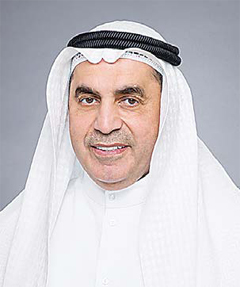KUWAIT: Oil prices declined sharply in October on intensifying global macroeconomic worries amid the prospect of ‘higher for longer’ central bank interest rates and despite the return of the geopolitical risk premium linked to the Zionist entity-Hamas conflict – which petered out towards the end of the month with the conflict appearing contained – and better-than-expected US and Chinese economic data.
Speculators also booked profits from oil’s precipitous rise in the third quarter. International benchmark Brent crude ended the month at $87.4/bbl (-8.3 percent m/m; +1.8 percent ytd), while local marker Kuwait Export Crude (KEC) fell to $91.3/bbl (-6.7 percent m/m; +11.3 percent ytd), outperforming Brent in 2023 reflecting tighter medium-sour crude fundamentals. Money manager net length, meanwhile, remained elevated in October, jumping after the outbreak of hostilities in Gaza.
In Kuwait, output was flat month-on-month at 2.55 mb/d in September, according to official sources. Earlier in October, the Kuwait Petroleum Corporation (KPC) unveiled its 2040 energy strategy, which includes $410 billion in planned investments in both fossil fuel ($300 billion) and renewable energies ($110 billion). Seeking to maximize refined products output from the new Al-Zour refinery and satisfy external demand for its crude, KPC reaffirmed its commitment to raise the country’s crude production capacity to 4.0 mb/d by 2040, with an interim target of 3.2 mb/d by 2025/2026. KPC hopes that its $110 billion investment in renewables will achieve Kuwait’s 2030 target of sourcing 15 percent of its total energy requirements from renewables and KPC’s 2050 target of carbon neutrality (2060 for the State of Kuwait).
Global macroeconomic conditions look to be softening against the backdrop of tighter global monetary policy, though the world’s two largest economies, US and China, both witnessed stronger-than-expected economic growth in Q3 2023. European economies, on the other hand, remain close to recession. The outlook for 2024 is proving difficult to gauge, though the International Monetary Fund in October did revise down slightly its forecast for world GDP growth to 2.9 percent (from 3.0 percent in June).
Reflecting the uncertainty, OPEC and the International Energy Agency (IEA) maintain widely divergent projections for oil demand in 2024. While the two organizations are closely aligned on this year’s demand growth forecast (2.3-2.4 mb/d), thanks to better-than-expected oil consumption in China, they differ significantly in their outlook for 2024.The IEA pegs growth at 0.9 mb/d, below the historical annual average, while OPEC is far more bullish at 2.2 mb/d.
The IEA also published new medium-to-long term oil demand forecasts. The eye-catching projection here is its base case scenario which sees demand peaking at 102 mb/d by 2030beforedeclining to 97 mb/d by mid-century due to reduced road transportation fuel use resulting from increased electrical vehicle penetration and slowing rates of Chinese economic growth. OPEC, in contrast, raised its long-term oil demand forecast by 6.2 mb/d from last year’s estimate to 116 mb/d by 2045, on stronger consumption in India, China and MENA.
On the supply side, combined data from OPEC secondary sources and S&P Global show aggregate OPEC+ production (excluding quota-exempt members) rising 372 kb/d to 35.9 mb/d in September. Oil output in Nigeria, while still significantly underperforming quota targets, led the gains (+141 kb/d to 1.39 mb/d) for the second consecutive month.
Kazakhstan and Saudi Arabia also increased output, by 90 kb/d and 82 kb/d, respectively. Meanwhile, quota-exempt Iran only managed a modest production increase in September (+10 kb/d) but surging oil output gains this year of almost 500 kb/d have brought production to its highest level in five years (3.1 mb/d), despite US sanctions. The US, meanwhile, eased its sanctions on Venezuela, a step that could see oil flows rise by around 200 kb/d in the near term.
In the US, weekly Energy Information Administration (EIA) data showed crude output surging to a record 13.2 mb/d in October, a substantial gain of 1.1 mb/d (+9.1 percent) year-to-date. Production growth in 2024 is not expected to be so robust, however, with the EIA estimating an annual average increase of just 374 kb/d to 13.2 mb/d (+2.9 percent y/y from an average of 12.8 mb/d in 2023).
What is impressive, however, is that output gains have occurred while the number of actively drilling oil rigs has declined, by 18 percent ytd (to 504) as of October’s close, according to Baker Hughes. Meanwhile, the Department of Energy (DoE) announced monthly solicitations to buy barrels at or below $79/bb l(for WTI) out to May 2024 in a bid to refill the US’s partially depleted Strategic Petroleum Reserve (SPR), currently standing at 351 mb (down 39 percent from March 2022 levels). The DoE aims to acquire 6 mb for delivery in both December and January.
In the short term, still tight oil market fundamentals and present-though-waning geopolitical risk are combining to lift oil prices. We maintain our forecast of Brent to average around $88/bbl this quarter. For 2024, uncertainty surrounding the outlook for oil demand and the path for OPEC+ voluntary supply cuts—due to be unwound in January—is complicating the picture. Nevertheless, with economic metrics pointing in a recessionary direction, amid continued tight monetary policy, oil demand growth is likely to slow in 2024. With non-OPEC supply gains likely to continue albeit at a slower rate, the onus to balance the market will once again fall on OPEC+ and Saudi Arabia especially to backstop any softness in oil prices. We see Brent averaging $85/bbl in 2024.










